|
eKnowledge's Approach to
Knowledge-leveraging Practices & Communities Today's business world puts a premium on anticipating and adapting to change as the rules of the game – and the game itself – keep changing (witness the emergence of e-commerce). As Gary Hamel, co-author of "Competing for the Future," puts it: "Competition today is not between products, it's between business models. The big challenge most companies face today is how to create business strategies and business models that generate new wealth." Thus, remaining in the game for a knowledge-intensive organization demands nothing less than ongoing upgrading and leveraging of its knowledge base – its "common sense" shaping its decisions and practices. The following outlines eKnowledge's approach to (1) assessing an organization's knowledge base; (2) identifying and supporting the communities that upgrade and leverage strategic knowledge into "real-world" competencies; and (3) intentionally evolving knowledge-leveraging practices and communities. eKnowledge evolves knowledge-leveraging practices with the communities that embody them. 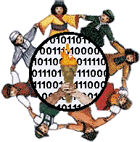 While information technology has inspired the "knowledge revolution," it takes building human communities to realize it. The challenge to assessing an organization's knowledge base is rooted in the nature of knowledge. Albert Einstein puts it aptly: "Knowledge is experience. Everything else is just information." Knowledge is both the embodied know-how acquired by participating in a community (using the tools, ideas and practices of that community) and the know-why or insights left over from using information and experience to think about a current situation. Thus, the assessment approach must capture the interpretative, situational, implicit, insightful, community-enacted nature of knowledge. Furthermore, the approach must be consistent with the ends. It must, in itself, be a process of upgrading and leveraging knowledge. One approach that meets these criteria is learning history – an adapted version of an ancient practice: community storytelling. Far from what information technology concepts and tools suggest, a knowledge base is best "documented" through stories that create the context where tangible events and intangible influences have meaning. This is in keeping with the fact that human beings upgrade and leverage knowledge primarily through stories (know-why) and modeling behaviors (know-how). 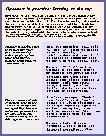
The learning history approach is a form of side-by-side story-telling and commentary that interweaves the actions, experiences and reasoning of initiators, opposers, followers and bystanders that led to notable results. Notable results are events that are visible and significant to the entire organization. They include "hard" financial and business results as well as "soft" people effects that are beyond what is anticipated, expected or easily explained. By being rooted in notable results, the learning history draws attention to those aspects of the knowledge base most in need of upgrading and leveraging.
Process and content are inseparable in making explicit the assumptions on which the organization has been built and is being run (its knowledge base). The learning history content (the document) is a means to an end – building capacity to upgrade and leverage knowledge via reflective conversations. Thus, all phases of the learning history process – planning, interviewing, distilling, writing, and disseminating  – are intended to stimulate self- and collaborative reflection into the know-hows and know-whys that guide decision and action in situations typically filled with conflicting values, choices and demands. – are intended to stimulate self- and collaborative reflection into the know-hows and know-whys that guide decision and action in situations typically filled with conflicting values, choices and demands.
Reflective conversations – where organization members think together – broaden and deepen understanding and appreciation of different perspectives on the tangible and intangible influences that led to a notable result. Grounded in this shared meaning, members can re-evaluate their own situations, add new knowledge and behaviors to their repertoire and consequently, expand their ability to create the results they desire. While the learning history process develops a common understanding of what knowledge is linked to notable results, upgrading and leveraging this strategic knowledge to benefit business strategy involves identifying (or seeding) and supporting CoPs that already (or potentially) use it.  Communities of practice is a relatively new concept in the management literature, although the phenomena is as old as the craft-based "corporations" in ancient Greece, the guilds of medieval Europe, or the professional groups. If the formal organization is the skeleton, its informal "infrastructure for knowing" – its social fabric of communities of practice – is the central nervous system, wired to create, anticipate and adapt to surprises in the "rules of the game."  Communities of practice (CoPs) arise out of people's natural desire to seek help, share insights, verify their thinking, keep up with cutting-edge developments, as well as maintain contact with others who care about the same things. Communities of practice (CoPs) arise out of people's natural desire to seek help, share insights, verify their thinking, keep up with cutting-edge developments, as well as maintain contact with others who care about the same things.
A CoP is an informal network that self-organizes around a common purpose based on a need to know what each other knows in order to solve problems, improve existing practices or evolve new ones. As people share ideas and experiences, they naturally tend to adopt common practices which reflect their collective learning. "Practice" in this context connotes "knowledge-in-action". Practice includes both the tangible (jargon, tools, documents, symbols, well-defined roles, specified criteria, codified procedures, regulations, etc) and the intangible (implicit relations, tacit conventions, stories, untold rules of thumb, shared beliefs and assumptions, etc) aspects of knowledge-in-action. 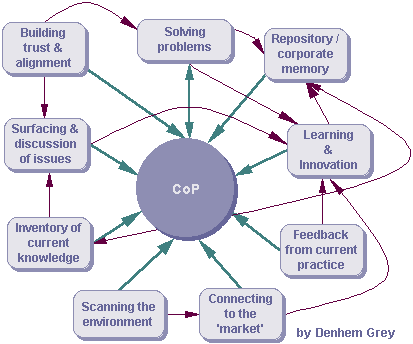 A CoP provides a "learning space" where members reflect on their experiences, explore their thinking, scope out their ideas, and experiment with their insights. Hence, CoPs are the "shop floor" for knowledge creation and renewal that depend on reflective conversations in trustful relationships. It is by these communities that an organization's knowledge base – as it manifests in organizational competencies – is leveraged and upgraded. CoPs are the basic building blocks of organizational competencies – knowledge-in-action at the organizational level – because they are the context in which what defines competence is continually negotiated through direct participation. A CoP provides a "learning space" where members reflect on their experiences, explore their thinking, scope out their ideas, and experiment with their insights. Hence, CoPs are the "shop floor" for knowledge creation and renewal that depend on reflective conversations in trustful relationships. It is by these communities that an organization's knowledge base – as it manifests in organizational competencies – is leveraged and upgraded. CoPs are the basic building blocks of organizational competencies – knowledge-in-action at the organizational level – because they are the context in which what defines competence is continually negotiated through direct participation.
 You have people who see the writing on the walls,
people who see new
You have people who see the writing on the walls,
people who see newopportunities. But there needs to be a legitimate route where they can be heard, where they can challenge the dominant logic of the organization. One process for identifying and seeding CoPs in the context of business strategy and the organization's knowledge base is Open Space Technology (OST). OST is a meeting process that opens new channels of communication and collaboration as groups ranging 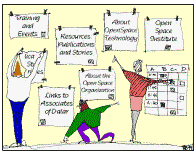 in
size from 5 to over 1000 self-select
topics (within the knowledge or business strategy theme of the event),
self-organize the agenda, and
self-manage the process to achieve
substantive outcomes. in
size from 5 to over 1000 self-select
topics (within the knowledge or business strategy theme of the event),
self-organize the agenda, and
self-manage the process to achieve
substantive outcomes.
OST surfaces existing or potential CoPs by inviting participation based on the same criteria as CoP membership: personal interest in the event's theme and willingness to take responsibility for contributing and/or learning about it. OST also taps into the same self-organizing dynamics that foster formation and growth of CoPs by freeing participants do what comes naturally: share stories, discover what already exists, explore differences and common ground to find other ways to meet needs, recruit allies, and take action with others sharing the same interest. 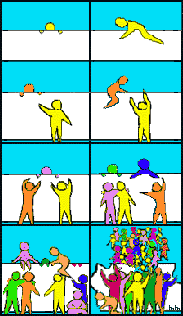 Linking identified and seeded CoPs to business strategy and/or strategic knowledge provides a business rationale for participation and support. Negotiating two-way value propositions between CoPs and the formal organization further legitimizes the work and resources required to sustain them. Noteworthy however, is that – unlike with teams – management dictates neither participation nor deliverables. CoPs' self-organizing drive can be easily smothered by organizational meddling. Nevertheless, the formal organization can create the conditions – like a gardener does to his garden – for CoPs' self-generated initiatives to enhance the organization's capacity to anticipate and adapt. Linking identified and seeded CoPs to business strategy and/or strategic knowledge provides a business rationale for participation and support. Negotiating two-way value propositions between CoPs and the formal organization further legitimizes the work and resources required to sustain them. Noteworthy however, is that – unlike with teams – management dictates neither participation nor deliverables. CoPs' self-organizing drive can be easily smothered by organizational meddling. Nevertheless, the formal organization can create the conditions – like a gardener does to his garden – for CoPs' self-generated initiatives to enhance the organization's capacity to anticipate and adapt.
The formal organization can nurture CoPs by: (1) Removing Barriers to Participation For instance:
Selected by the community for his/her integrity, expertise and people skills, the broker has official responsibility for such activities as:
 Since knowledge includes both information and
thinking, a knowledge management
system should integrate forums for thinking together (e.g., real-time
and asynchronous conversation-support software) with web sites and
web-enabled knowledge repositories (populated by information deemed
meaningful by community members and built upon by recorded on-line
conversations). The knowledge management system should enable community
members to upgrade and leverage their knowledge, collaborate, and
coordinate their action, from anywhere, anytime.
Since knowledge includes both information and
thinking, a knowledge management
system should integrate forums for thinking together (e.g., real-time
and asynchronous conversation-support software) with web sites and
web-enabled knowledge repositories (populated by information deemed
meaningful by community members and built upon by recorded on-line
conversations). The knowledge management system should enable community
members to upgrade and leverage their knowledge, collaborate, and
coordinate their action, from anywhere, anytime.
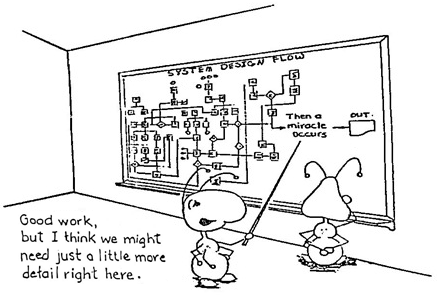 All human knowledge takes the form of interpretation. Drawing attention to an organization's knowledge base and valuing its CoPs help set the stage for intentionally evolving knowledge-leveraging practices and communities. Knowledge-leveraging practices and communities – where practitioners think and act together to continuously transform information and experience into insights and insights into solutions and competencies – enhance the capacity of members and the organization as a whole to interact with the unexpected, accidental and ambiguous in their environments. A practice – and the community that embodies it – is knowledge-leveraging when the community of practitioners encourages:
 If you want to know the
If you want to know the
theory and methods of revolution, you must take part in revolution. All genuine knowledge originates in direct experience. Knowledge-leveraging practices and communities engage the fullness of our human ability to learn, create, change. The approach outlined thus far is but one scenario of one evolutionary path. Ultimately, eKnowledge intentionally evolves knowledge-leveraging practices and communities primarily by participating – as co-learner and empathic provocateur – in the journey of optimizing organizational performance. 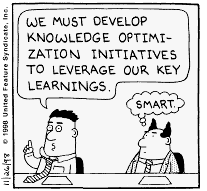 In the new economy, the two key sources of wealth are knowledge and communities of practice. In due course, knowledge-leveraging practices – and the communities that embody them – enable an organization to live in change and thus, to continue to deliver value as the rules of the game – and the game itself – keep changing. |
||||||||||||||||||
